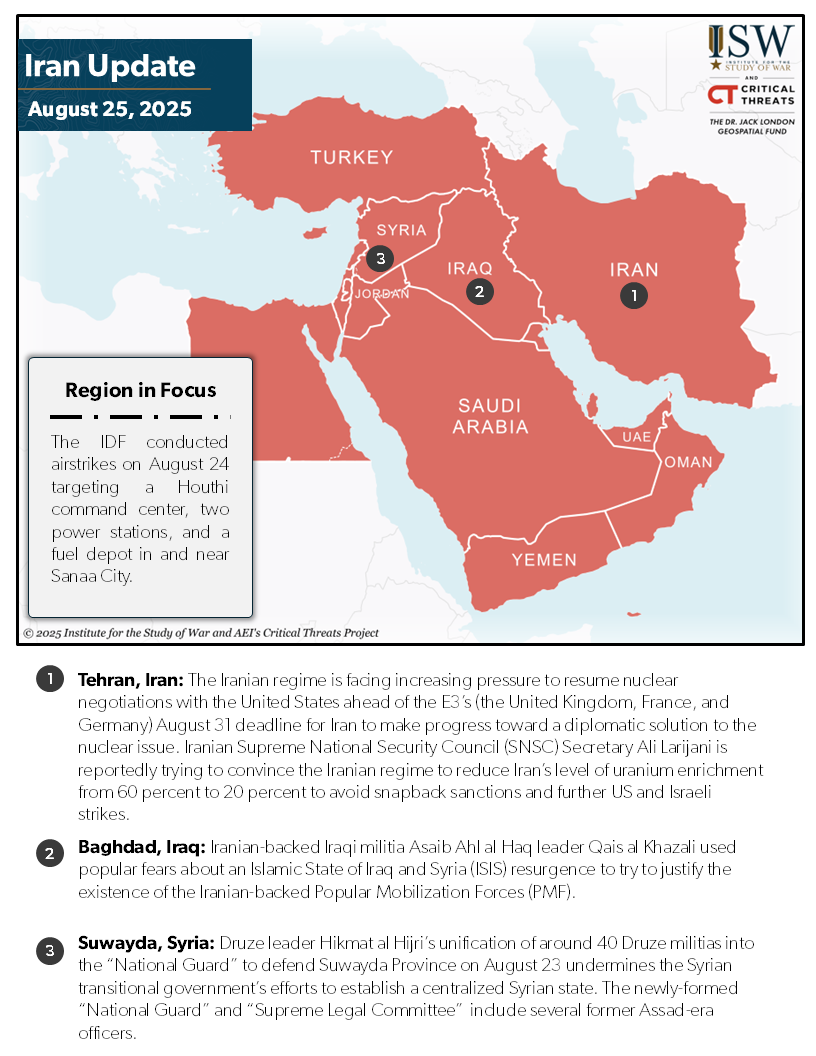Iranian Supreme Leader Ali Khamenei rejected recent calls by Iranian reformist officials to reform Iran’s domestic and foreign policies. Khamenei delivered a speech on August 24 in which he claimed that “Iran’s enemies” failed to defeat Iran during the Israel-Iran War and are now trying to do so by “creating discord in the country.” Khamenei claimed that agents of the United States and Israel, along with “heedless speakers and writers,” are creating division. Khamenei may have used the term “heedless speakers and writers” to refer to reformist officials who have recently called on the regime to reform its domestic and foreign policies. Former Iranian President Hassan Rouhani called on August 13 for the regime to make concessions to the Iranian people, strengthen societal resilience, and reduce tensions with the West. The Iranian Reformist Front separately issued a statement on August 17 that called for political reforms and foreign policy shifts, including suspending uranium enrichment under International Atomic Energy Agency (IAEA) oversight. Khamenei rejected this and similar calls to engage with the United States in his speech on August 24, stating that the conflict between Iran and the United States is “unsolvable.” Khamenei additionally rejected direct talks with the United States but did not explicitly rule out the possibility of indirect negotiations.
The Iranian regime is facing increasing pressure to resume nuclear negotiations with the United States ahead of the E3’s (the United Kingdom, France, and Germany) August 31 deadline for Iran to make progress toward a diplomatic solution to the nuclear issue. An Iranian delegation led by Deputy Foreign Affairs Minister for Political Affairs Majid Takht Ravanchi will meet with E3 officials in Geneva, Switzerland, on August 26 to continue talks over potential snapback sanctions. British Foreign Secretary David Lammy stated on August 22 that the E3 will activate the snapback mechanism to reimpose United Nations Security Council (UNSC) sanctions on Iran unless Iran agrees to a “verifiable, durable deal.” A senior French diplomat told Saudi media on August 25 that the meeting in Geneva would be the “last window open to the Iranian side.” The E3 imposed a deadline of August 31 on Iran to make meaningful progress toward a nuclear deal, such as by renewing cooperation with the International Atomic Energy Agency (IAEA) and resuming negotiations with the United States. The E3 offered to postpone the expiration of the snapback mechanism to allow Iran more time to negotiate with the United States. The snapback mechanism is currently set to expire in October 2025. Iranian officials have rejected postponing the deadline because extending the deadline would provide the E3 with more time to trigger the snapback mechanism. The E3 would need to initiate the snapback process by September 3 in order to complete the process by the current October deadline. The snapback mechanism would reimpose six UNSC resolutions on Iran, including bans on the transfer of conventional arms to and from Iran, international support for Iran's missile program, enrichment-related activities, and the testing and development of nuclear-capable missiles.
Iranian Supreme National Security Council (SNSC) Secretary Ali Larijani is reportedly trying to convince the Iranian regime to reduce Iran’s level of uranium enrichment from 60 percent to 20 percent to avoid snapback sanctions and further US and Israeli strikes, according to a senior Iranian official speaking to The Telegraph on August 24. The senior official stated that Larijani is concerned that another war with the United States or Israel could present a major challenge to the regime. Larijani reportedly faces the most opposition from Islamic Revolutionary Guards Corps (IRGC) members. The official also stated that Iranian leaders appear “willing to comply” with Larijani's call to reduce enrichment levels and re-engage with Western countries. The Washington Post similarly reported on July 13 that there is a “consensus” among Iran’s political class that Iran needs to resume nuclear negotiations with the United States, citing political observers inside and outside of Iran. These reports suggest that Iranian moderates who support nuclear negotiations with the United States are continuing to prevail over Iranian hardliners who reject negotiations. Larijani replaced Ali Akbar Ahmadian as SNSC secretary on August 5 as part of a broader restructuring of Iranian defense and security institutions after the Israel-Iran War. Larijani is a moderate politician who supported the 2015 Joint Comprehensive Plan of Action (JCPOA). | 




 [국방부] 정전협정 당일 전사한 '고(故) 김금득 하사' 72년 만에 ...
[국방부] 정전협정 당일 전사한 '고(故) 김금득 하사' 72년 만에 ...
 [ISW] 이란 업데이트, 2025년 8월 25일
[ISW] 이란 업데이트, 2025년 8월 25일